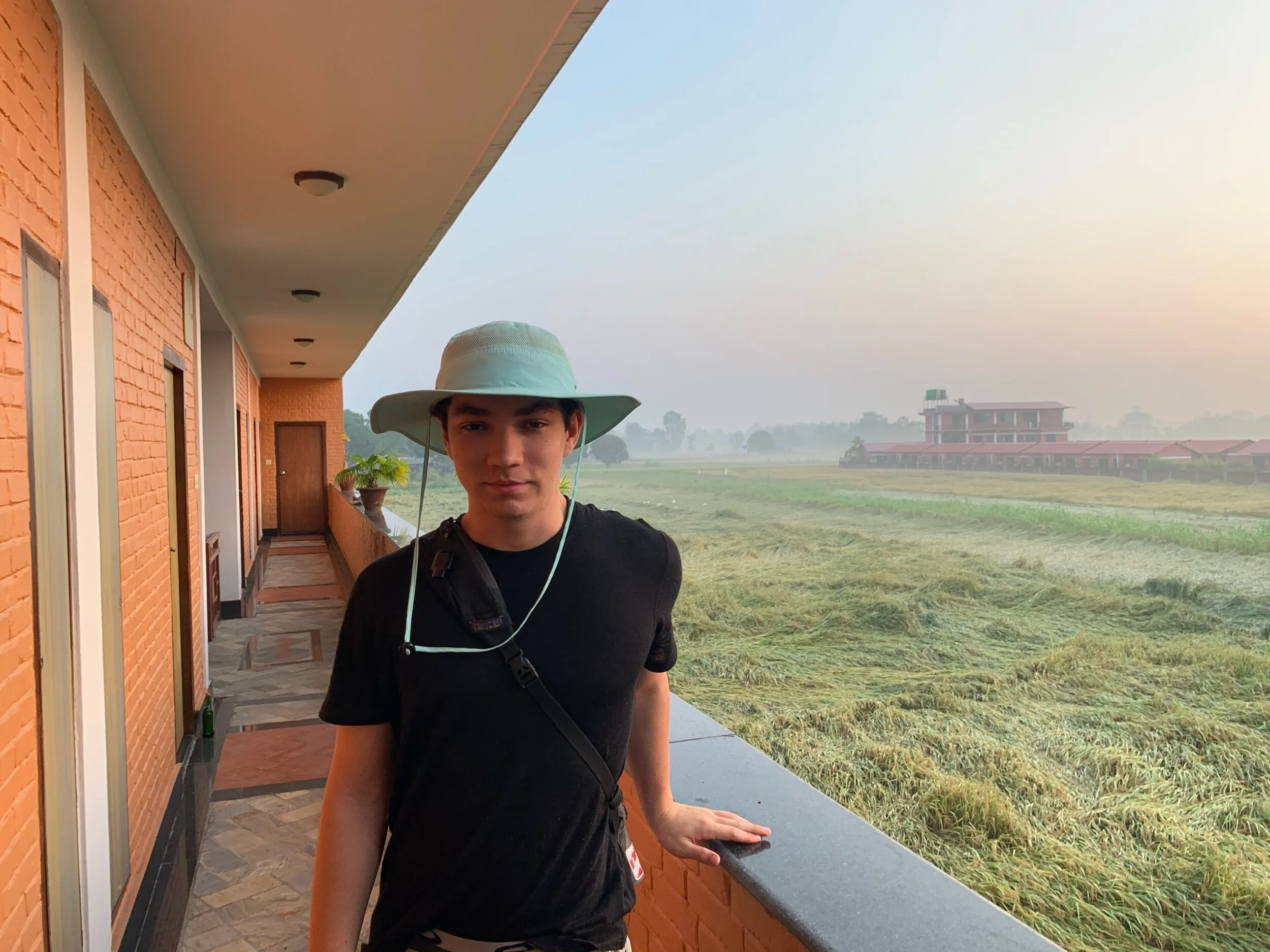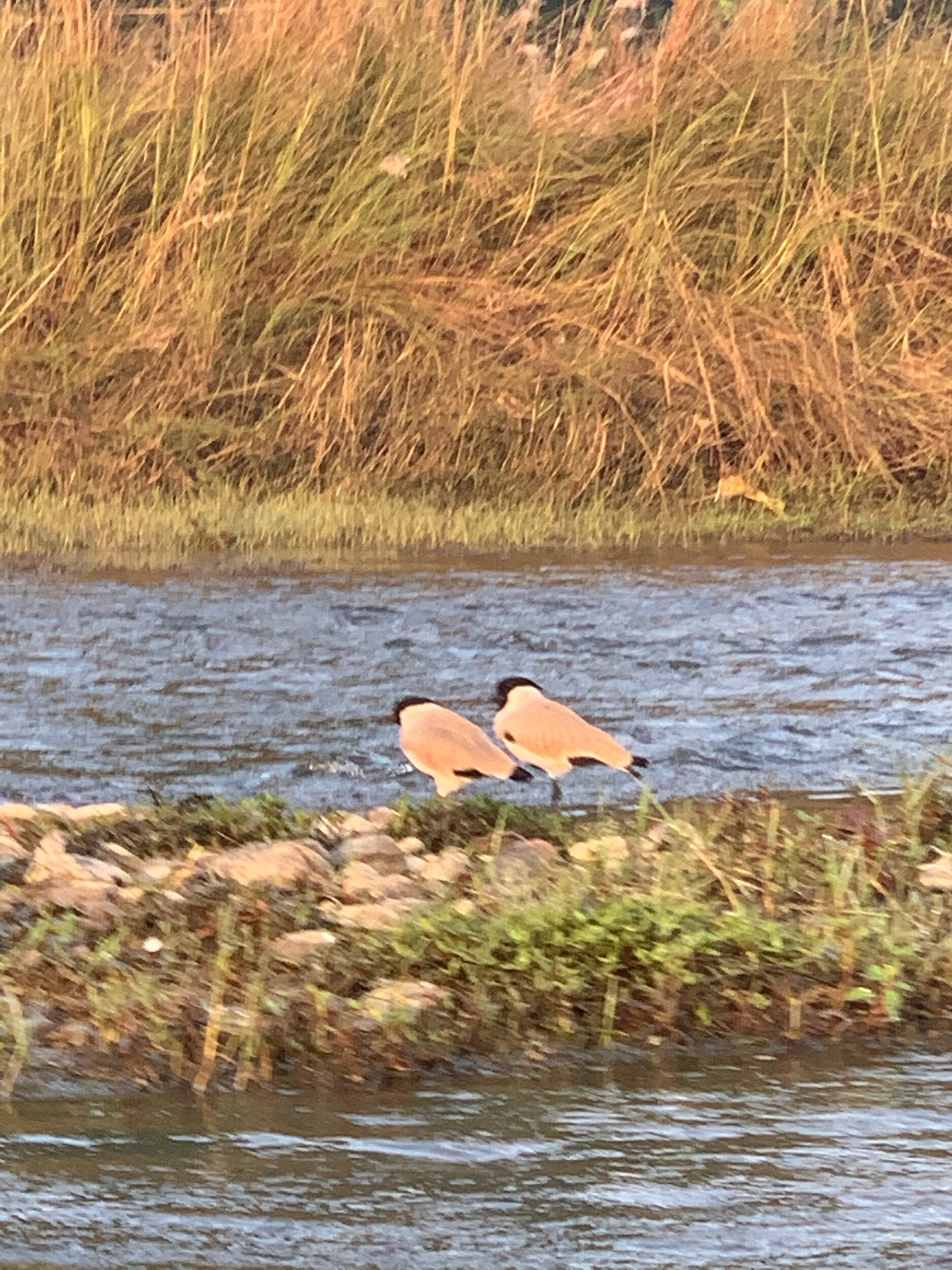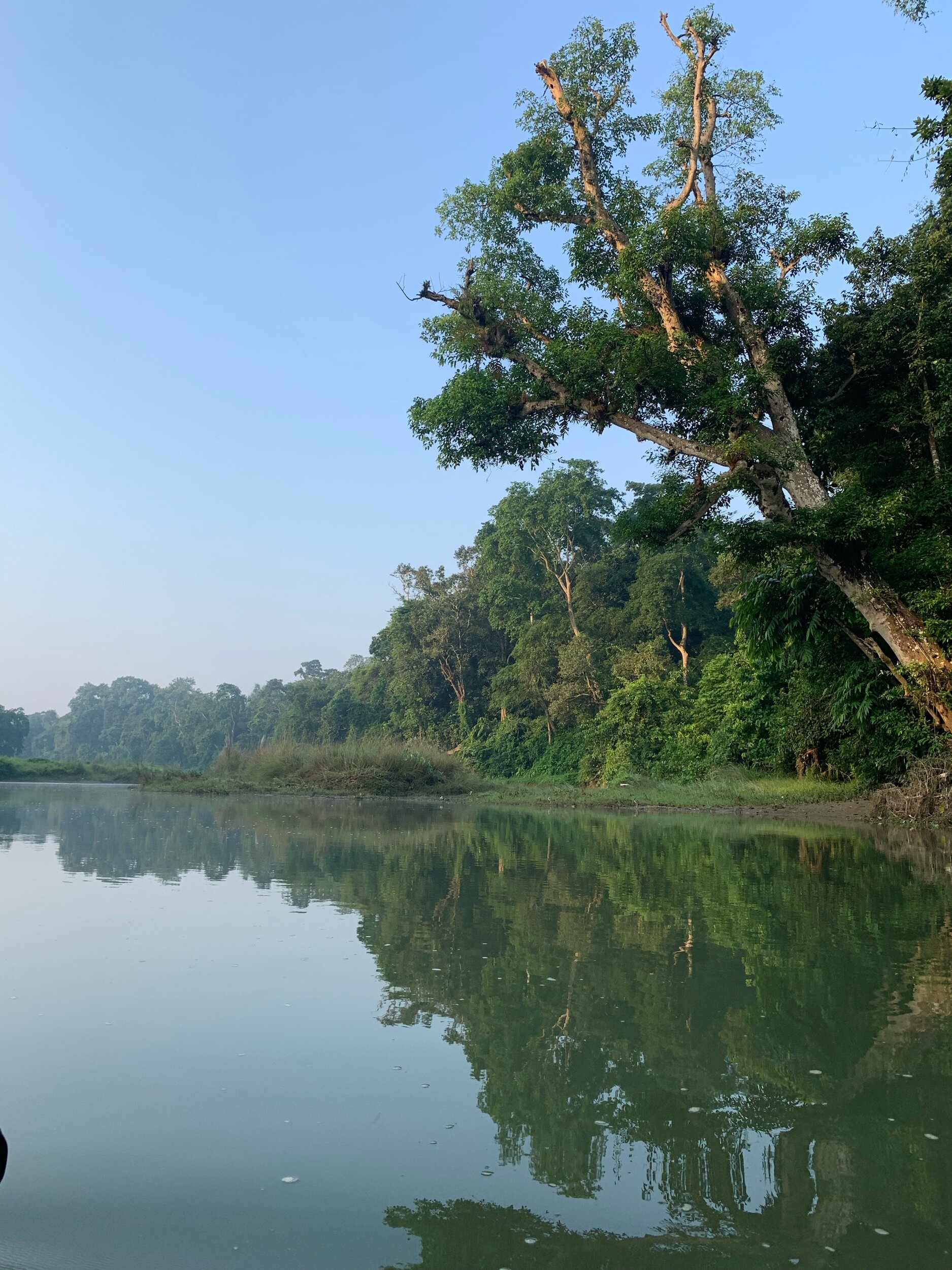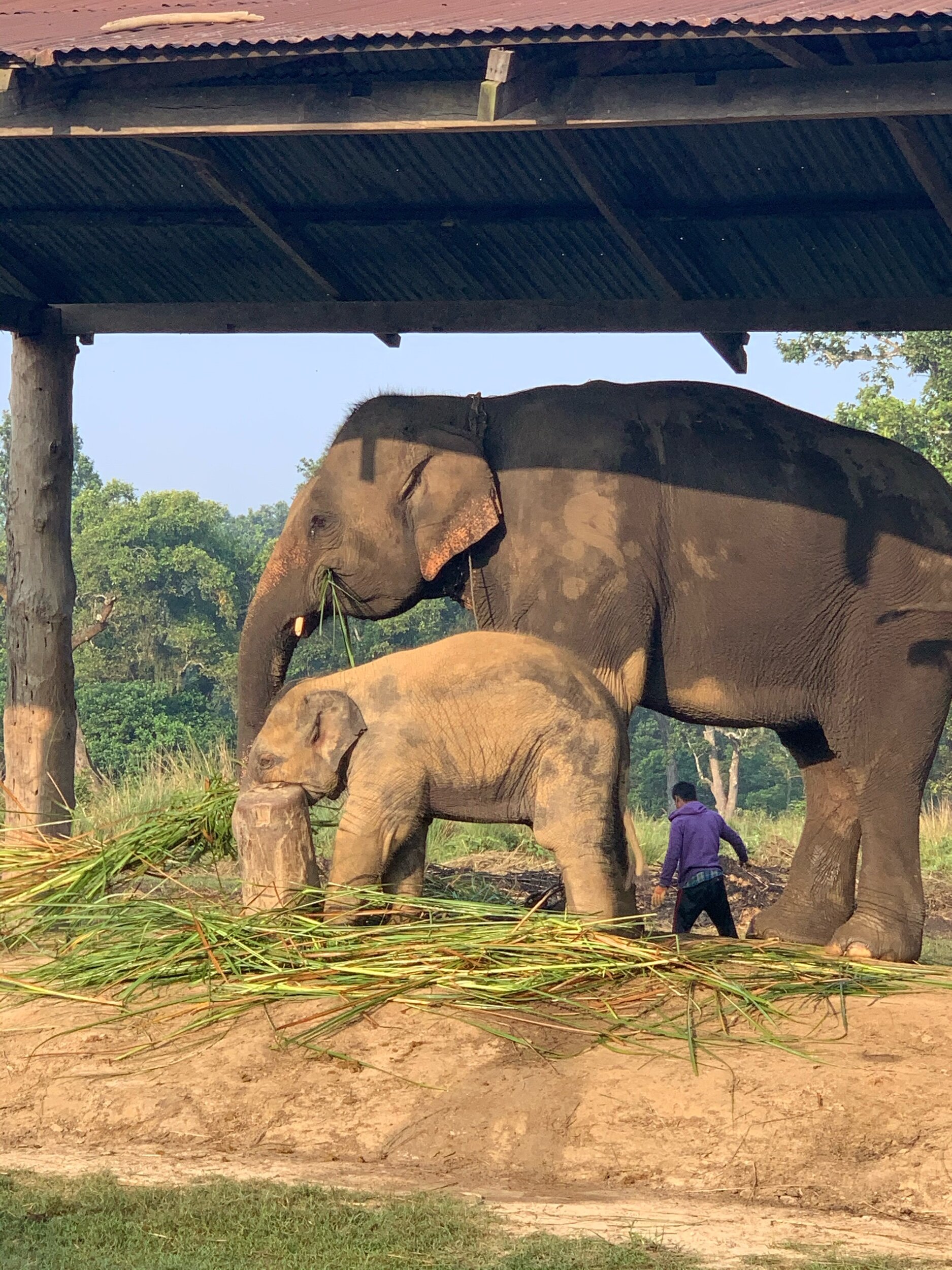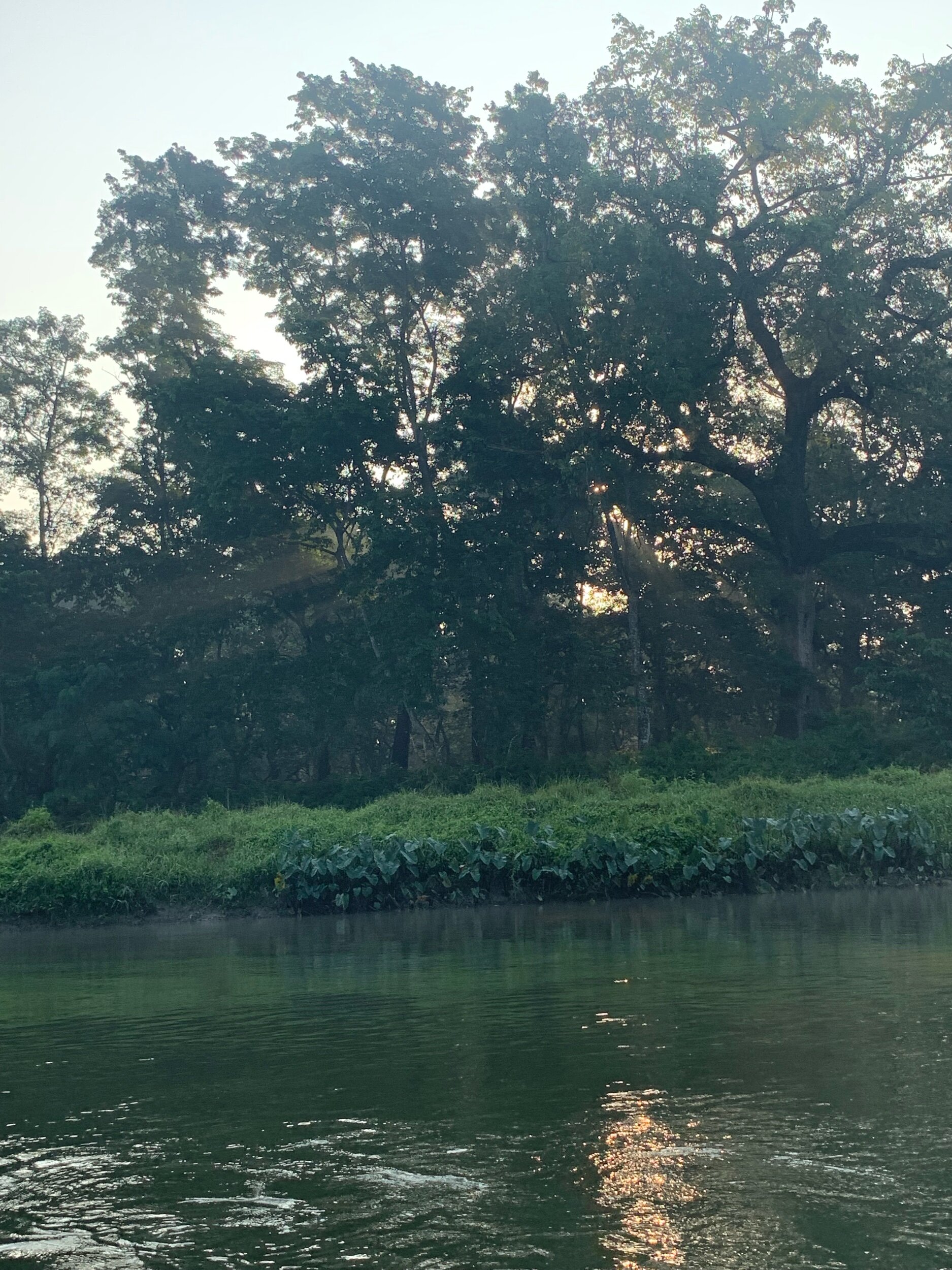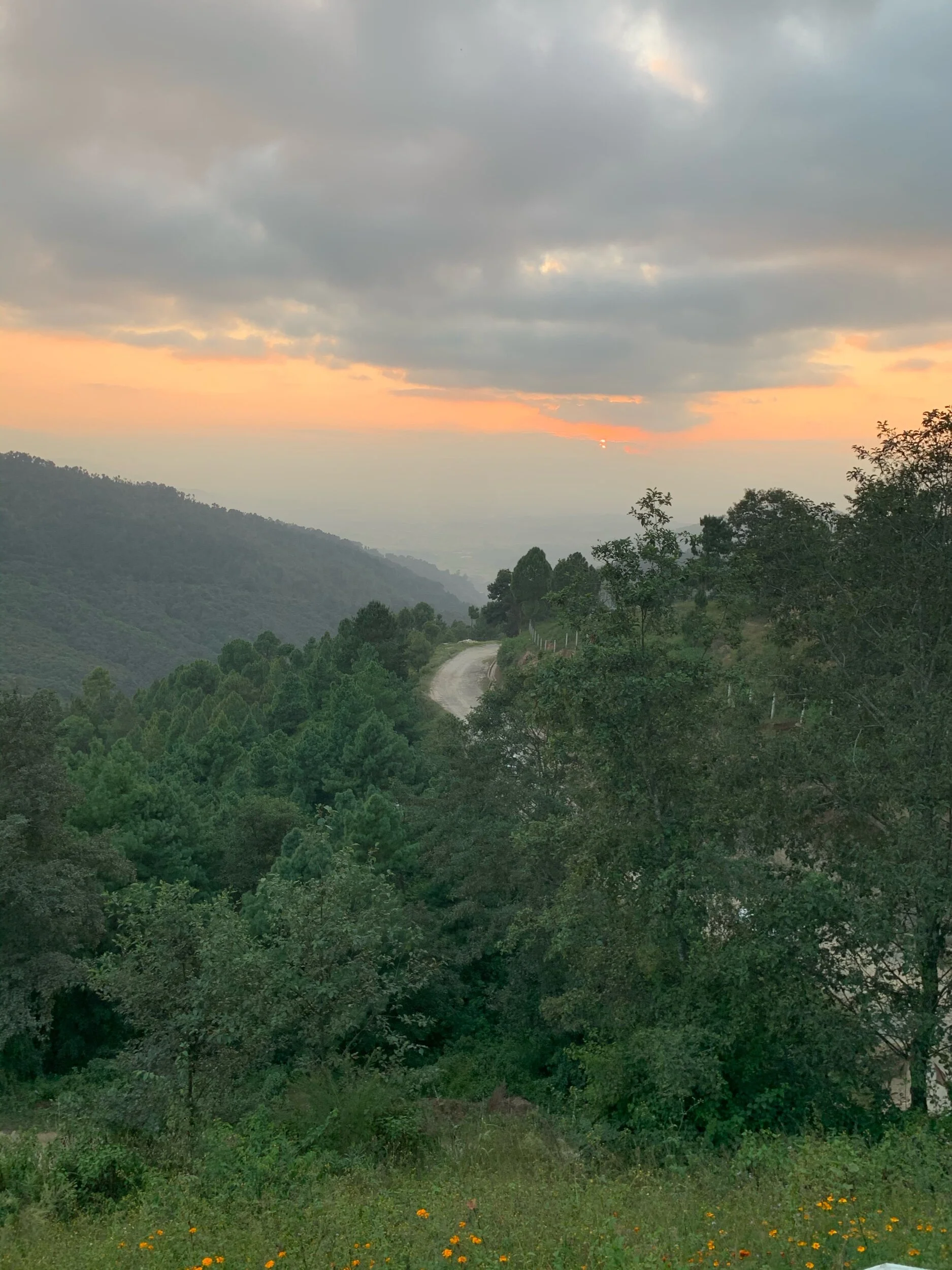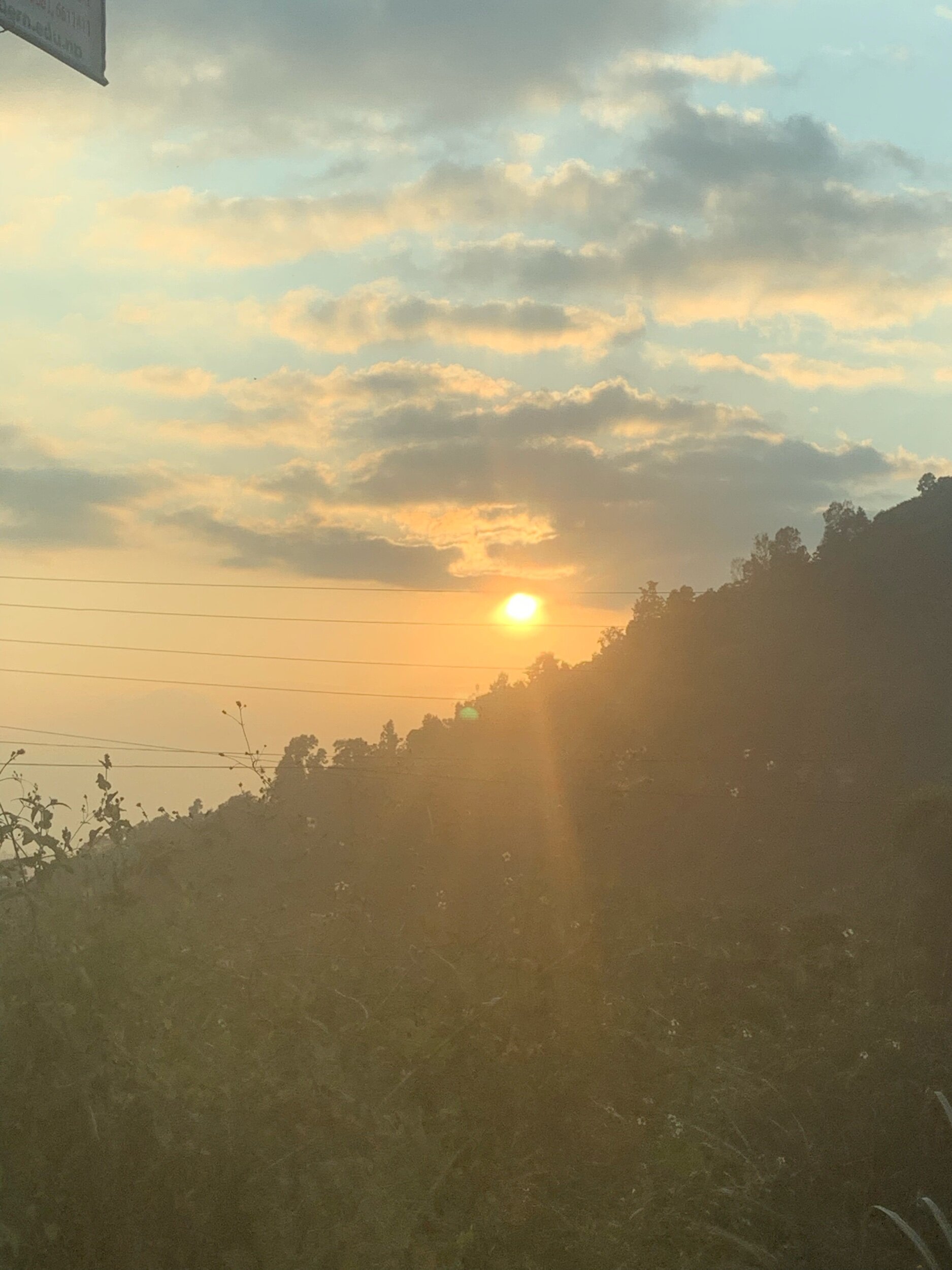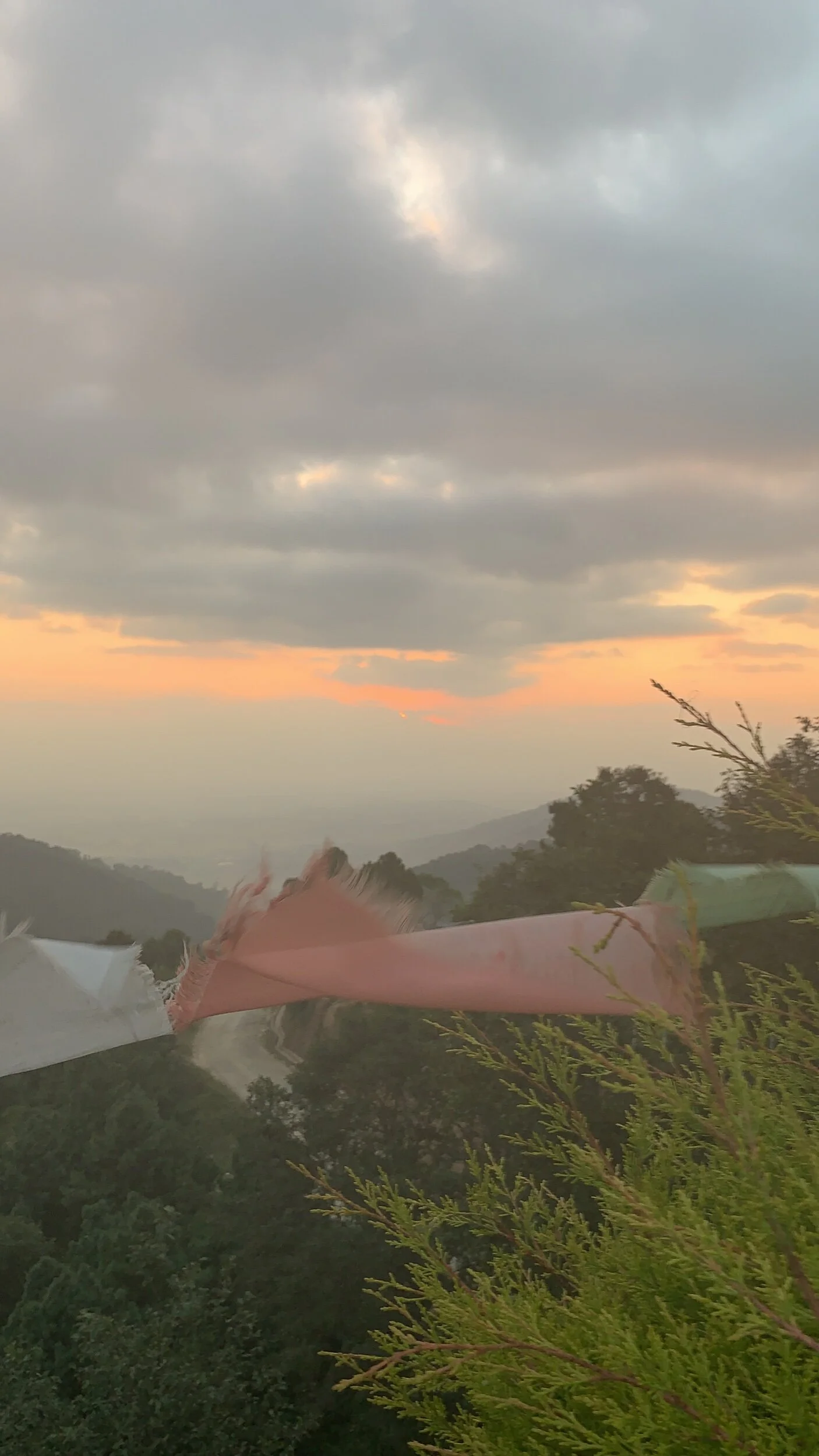10-12-19 - Chitwan / Nagarkot - Canoe ride
/Day 118. Kyle & Leanne joint blog.
Happy 79th birthday to Pat, Leanne’s mom, from Nepal. We miss you!!!!
We wake at 6 am to the sun rising and a rooster cock-a-doodle-doing. In the lobby, our guides are awake and perky excited for our early morning canoe ride. Leanne is bewildered how happy, kind and compassionate everyone is. No wonder Nepalese are known for their UN Peacekeeping Troops. You cannot shake the happy from them.
Our guide Deepak says that Nepal is ranked as the 2nd happiest people in Southeast Asia (Bhutan is number one). He attributes it to their living in the present, enjoyment of family, lack of pursuit of material things all of which result in a stress-free life. Seeing how much Deepak laughs every day, we can’t argue with his logic.
We take a van to where the wooden canoes are on the streams edge. Our canoe ride entails a varietal of birds, wild peacocks, spotted deer, heron and a dozen Ghiral crocs. With some international help from companies like Lacoste and even the Smithsonian, the locals are desperately trying to increase their Ghiral croc population as we learned at the breeding center yesterday. About 40 crocs are introduced to this stream every year.
The 15 feet by 2 feet wide skinny canoe is made by the Thatu tribe from dark hardwood from just one tree. The canoes glide softly over the water as if floating maneuvered by the boat guide’s stick while he stands on one end.
At this early morning, before most tourists and locals arise, this canoe ride had all the makings to become our most peaceful excursion of the trip. We can hear the ripples in the steam and even a distant birdsong. Ah a peaceful excursion indeed.
But......a tired two year old tourist sharing our canoe had other ideas. Apparently he didn’t so willingly wake up for a boat ride. The mom and dad certainly attempted to quell the wailing toddler - even going so far as removing all his clothes. I nearly handed back my iPhone open to the Pokémon go app in an attempt to quiet the lad.
The problem becomes that the boat is very sensitive to any slight weight shifts and the crocodile-infested waters are a mere 3 powerful toddler kicks from us becoming a croc’s morning breakfast intake. Global Teen Adventures might need to be rebranded Global Teen Horrors. We speculate whether John will continue on with the girls we if don’t survive the toddler induced tipped over canoe into croc infested waters.
Corey muses over the terrible two toddler’s antics, “our probability of seeing another Bengal tiger just went out the window with the kids screaming.” Birds flew away quickly to avoid the kid’s screeches (wish we could have).
The dad starts yelling at the mom, the mom starts yelling at the kid and the kid is now screaming louder at every species known to man within 300 yards. So much for my peaceful birdwatching, animal gazing morning. I guess the parents didn’t read the “Humble Request” sign at the front that prohibited noise pollution of any kind in the park. Next year, cough it up for Disneyland, daddy!!!
After 45 minutes, the mom finally settles the kid down and the canoe ride promptly ends three minutes later. Despite the terrible two toddler, we still got to see more in the one hour boat ride than the four hours in the Jeep yesterday. In a way, the toddler helped us see more animals as they all flew and ran away in terror from his approaching screeching. Yes, we remember what it was like to have our kids unleash the terrible two tantrums at the most inopportune time and that is why we have full authority to incorporate it in our story.
We disembark from the canoe and hike over to the Chitwan Elephant Breeding and Training Center. It was magical. After a quick trip to the Visitors Center to learn everything you need to know about elephants, we see 20 elephants enjoying their breakfast — including a 20 day old baby. The center is only open early morning and late afternoon because in the middle of the day the keepers are walking the elephants around their native forests and streams - a practice that certainly makes good sense. The keepers are Tharu tribe folk who maintain an unmistakably close man-elephant bond built over centuries of cohabitation.
We learn that our guide Sanjay is from a similar tribe nearby - Chaudhari tribe - indigenous people who have found a new purpose in serving as English speaking guides to the Americans, British, Indians, Germans and others who visit Chitwan for jungle safaris. Deepak has shared there are 124 castes in Nepal and that our van driver from another caste last night caught a duck, snapped its neck and cooked it for dinner — thrilled with his fresh duck meat. Nepal represents the simple, happy way of life so many others seek.
We all head to breakfast and almost get steamrolled over by the 100 or so Indian teenagers at the hotel for an adventure weekend. Around 9 am, we enter our van ready for the 7 hour ride to Kathmandu towards our last stop in Nepal. Chitwan returned us to nature and animals with the yummiest Nepalese-Indian food offerings. What else will we find in Nepal?
Our journey out from the jungle has already stretched from 7 hours to 9 hours as we hit a traffic accident which combined with the already heavy traffic heading back from the Dashain festival stalls our progress for two hours. However the road is paved and the van is comfortable which decent shock absorbers. We count our blessings that we are healthier this week and well fed.
The two way road is jam packed with buses, cabs, mopeds and big trucks. The type of vehicle least seen is a personal car. Our driver explains personal cars are taxed at 245 percent to discourage that consumption (traffic is heavy enough). With 45 percent living in poverty (according to Oxford), transportation becomes a luxury item. There are really only mom and pop shops that sell what you need but there does seem to be more stores than the population requires (non- scientifically based though!). A small village might have 10 mini-7-11s hoping to hawk you a Fanta and some chips.
As we drive along to road towards Kathmandu, we notice Some homes are bright and colorful and look modern. But the vast majority of homes are small basic concrete structures with metal roofs held on by gravity and large heavy rocks. Clothes hang out for drying, children outdoors watched by elders sitting on porches. There is often some form of porch or overhang to cover from the hot sun.
The slower pace of travelling in traffic gives us longer time to view their lives. See the emotions on their faces as they peak at us too. There are plenty of folks walking along the road - many often carrying heavy loads on their backs of barley, water or grass. On mopeds you may see up to give humans one on. Babies strapped to a mom or dad with a sheet as they sleep in the wind.
To see the abject poverty, the scene reminds Kyle and Leanne of their Africa trip in 2001. Happy people, undeveloped infrastructure, villages, tribes and a questionable government clearly not on the ball. We can appreciate all we have in the United States after a week here. However the people exist. They exist without a lot of life conveniences that we depend on. A road. A dryer. An air conditioner. Running water in cases.
Despite the long ride, the kids are silent. Perhaps these scenes are equally as distressing or eye opening to them. Our driver tells us his wife has been turned down for a tourist visa to the US (where they have family) twice. His own brother who lives in the states now finds it hard to return here for more than a week or two.
That said, here in Nepal, we have been treated like royalty. Juice upon arrival at hotels, a guide that caters to our every need and driven around the windy curvy roads by a courteous, selfless driver. Our privilege of being here needs to be recognized, realized and appreciated every day that we are here and beyond. We feel so welcomed everywhere we go here in Nepal. May God bless Nepal.
Kyle points out that God may have blessed Nepal but he apparently forgot to bless the roads. After circling around Katmandu we head out for Nagarkot and the road quickly turns to unpaved, rocky terrain reminiscent of the drive from the border to Katmandu. After six hours on the road, these last two hours prove challenging on the sore, achy butts and legs. A little before our hotel, we pull over and climb one hundred stairs to watch sunset over the valley below and city in the distant background. There is a large outdoor Buddha statue that we take a picture of with the kids.
We finally make it to the hotel after dark. The hotel is built into the side of the mountain overlooking the valley. It is rustic and charming with all sorts of activities. We were supposed to arrive mid-afternoon so we’d have time to do some of them but with the traffic, that plan does not come to fruition. None-the-less, the rooms are nice and Leanne and I enjoy a drink on a sweet couch in the upstairs lodge bar while the kids explore.
We re-convene for YAB (yet another buffet) for dinner. The part of the trip with driving and hotels has resulted in the double whammy of dramatically reduced steps and dramatically increased food intake via three buffet meals a day. We swear the scale in this hotel is not working correctly, must be the high altitude causing it to add the extra kilograms.
We are off to bed as we have a 5:30am wake-up call tomorrow to catch sunrise over the valley from our hotel room.















